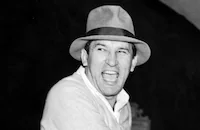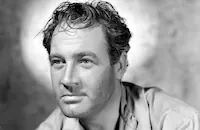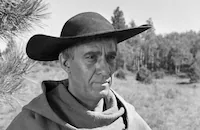Another Dawn

Brief Synopsis
Cast & Crew
William Dieterle
Kay Francis
Errol Flynn
Ian Hunter
Frieda Inescort
Herbert Mundin
Film Details
Technical Specs

Synopsis
British Colonel John Wister, on leave from his post in the Sahara, meets and falls in love with a beautiful American named Julia Ashton. Julia agrees to marry him, but cautions that she can never love him because her heart belongs to her former fiancé, an aviator who died tragically in a plane accident. John and Julia marry and return to Dikut, where Julia meets John's best friend, Capt. Denny Roark, and Denny's sister Grace, who is in love with John but successfully hides her heartbreak over his marriage. Within a few weeks, Denny's charm, so reminiscent of Julia's lost love, captures her heart, and after realizing that they are in love, Denny decides to transfer to another garrison. John discovers that Julia has fallen in love with Denny, and although he would give her her freedom, he knows that she is too decent to leave him. Fate presents a solution when circumstances dictate that one of the two men must fly a fatal bombing mission. Although Denny wins a coin toss, at dawn, while Grace and Denny are saying their last goodbyes, John flies off to certain death, sacrificing his life so that Julia and Denny can be together.

Director

William Dieterle
Cast

Kay Francis

Errol Flynn

Ian Hunter

Frieda Inescort

Herbert Mundin
G. P. Huntley Jr.

Billy Bevan
Clyde Cook
Richard Powell
Kenneth Hunter
Mary Forbes

Eily Malyon
Charles Austin
Joseph Tozer
Ben Weldon
Spencer Teakle
David Clyde

Charles Irwin
Reginald Sheffield

Martin Garralaga
George Regas
Edward Dew
R. M. Simpson
Tyrone Brereton
Yorke Sherwood
E. L. Fisher-smith
Alec Harford
Will Stanton
Neal Kennedy
Claire Vedera
Stefan Moritz
John Mccallum
Robert M. Simpson
Jack Richardson

Leonard Mudie
Milton Kibbee
Crew
Al Alborn
Harry Joe Brown
Ralph Dawson
Laird Doyle
Ruby Felker
Leo F. Forbstein
Hugo Friedhofer
Frank Gaudio
Tony Gaudio
James Gibbons
Ida Greenfield
Robert Haas
Ward Hamilton
Glen Harris
Major Sam Harris
Frank Heath
Erich Wolfgang Korngold
Madison Lacey
Stanley Logan
Orry-kelly
Pat Patterson
Milan Roder
Willard Van Enger
Jack Warner
Henry West

Videos
Movie Clip



Trailer
Film Details
Technical Specs

Articles
Another Dawn
In fact, the very title of the movie reflected its conflicted artistic stature. The name Another Dawn had been previously used for other Warner movies as a film-in-production title when they needed to show a movie poster or marquee for pre-release publicity purposes. When executives plucked it out to serve as the title for their new Kay Francis-Errol Flynn movie, it was considered an inside joke, a generic title for a generic historical romance. Only this Another Dawn happened to star one of the most handsome and appealing young leading men in Hollywood.
Despite his relative newcomer status, Flynn was quite confident of his own abilities and potential and not-so-secretly resented being cast in the movie. He also didn't care for director William Dieterle, a brilliant German émigré and Max Reinhardt protégée, a physically huge former actor whose overpowering physical presence intimidated and annoyed Flynn. Adding to the tension on the set were Flynn's ongoing contract negotiations with the studio. His agent Myron Selznick had been working on a new deal with Warner Bros. which would guarantee Flynn's weekly salary as well as three months of vacation time per year, but written confirmation of the promised deal was slow in coming. Following the instructions of his agent Selznick who had told him not to budge until the deal was sealed in writing, Errol refused to come out of his dressing room one afternoon to shoot a pivotal scene with Kay Francis. Studio head Jack Warner was forced to call agent Selznick and have a telegram with the requested contract points delivered, and shortly afterwards Flynn appeared on the set ready to shoot the scene.
Even before this showdown, Errol Flynn hadn't been on his best behavior. His dislike for Dieterle manifested itself in chronic tardiness and a disinterested insolence which prompted Flynn to inquire "What do I say here?" before every new scene. He also claimed to not understand Dieterle's directorial requests unless every action was explicitly laid out. Add to that a discontented Flynn's continuous complaints about everything and his evident unhappiness, and you have a movie with little chance of meeting or surprising anyone's expectations. In addition to Flynn's distress, director William Dieterle later expressed his own dislike for the movie.
Despite the problems behind the scenes, Another Dawn was produced with Warner Bros.'s customary care and professionalism. The action sequences were shot both in Yuma, Arizona and the area known as Lasky Mesa, in Calabasas, California. Flynn's equestrian skills were again put to the test - after getting a workout in The Charge of the Light Brigade in the scenes where the British forces are attacked by Arab combatants, and he reportedly took a few tumbles off his horse.
One of the most interesting aspects of Another Dawn was its score by acclaimed composer Erich Wolfgang Korngold. Reportedly, Korngold, only recently arrived in Hollywood from Germany, was not yet completely proficient in English and was composing the score to Flynn's film without totally understanding the dialogue. What he sensed from the movie was great drama and mighty passions which were more indicative of an epic and not a period soap opera. At the time Korngold was composing the score, Another Dawn was longer but was cut before release, another sign of its problematic birth. Korngold was disappointed and shocked to see much of his music discarded or muted, but would later resurrect the movie's love theme in his famous Violin Concerto in D Major from 1945. Fortunately for fans of film music, Korngold's complete original score for Another Dawn, including all lost sequences, was located, restored and re-recorded in 1995.
Even if Another Dawn doesn't reach the heights of some other Errol Flynn vehicles, it is still a treat to see this iridescent specimen of masculinity at his peak in his mid-twenties, handsome and dashing in a British Army uniform. Even in a movie that doesn't come close to optimizing his onscreen charisma, he's still a delight to behold and hear, an almost impossibly beautiful actor who, in the sad way these stories often end, would barely live to see his 50th birthday.
Producer: Harry Joe Brown, Hal B. Wallis, Jack L. Warner
Director: William Dieterle
Screenplay: Laird Doyle, W. Somerset Maugham (story)
Cinematography: Tony Gaudio
Film Editing: Ralph Dawson
Art Direction: Robert Haas
Music: Erich Wolfgang Korngold
Cast: Kay Francis (Julia Ashton Wister), Errol Flynn (Captain Denny Roark), Ian Hunter (Colonel John Wister), Frieda Inescort (Grace Roark), Herbert Mundin (Wilkins), G.P. Huntley (Lord Alden).
BW-73m.
by Lisa Mateas

Another Dawn
Quotes
Trivia
Before this movie was made, any Warner Brothers film which showed a movie marquee would indicate that a movie named "Another Dawn" was playing at the cinema. Unable to come up with a title for this film, they decided to actually create a movie named "Another Dawn."
Notes
The film's pre-release title was Caesar's Wife. Screenwriter Laird Doyle died in an airplane accident shortly before the film's release. According to a news item in Film Daily, Bette Davis was originally supposed to have the role of "Julia." Modern sources note that the film was shot on location in the Yuma desert between California and Arizona.















